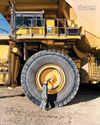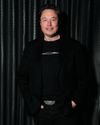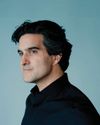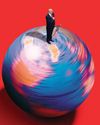
AT THE CROWN of Roelof Botha’s otherwise perfectly coiffed, light-brown head of hair, there’s a small patch that’s gone completely white. It’s the result of a serious concussion Botha incurred in his twenties while playing rugby, his sport of choice in his native South Africa and in business school at Stanford.
That injury ended his playing days. But spend some time with Botha—who’s now the head of Sequoia Capital, one of the oldest, largest, and most successful firms in venture capital—and rugby will come up again and again. Botha cites lessons from rugby in talks with founders and colleagues, and watches it devotedly while he exercises. The game has provided him with endless analogies about the value of teamwork and resilience—and some decent one-liners.
“Soccer is 90 minutes of pretending to be hurt when you’re not,” Botha tells me. “And rugby is 80 minutes of pretending not to be hurt, with blood spewing on your face.”
While some soccer fans might quibble with the comparison, rugby is, indisputably, not for the faint of heart. Then again, neither is Botha’s other passion: venture capital. The industry that has become a financing pipeline for young, innovative, and risky companies is known for dramatic booms and busts—and it’s coming off a particularly harrowing cycle. A COVID-era bump in demand for all things tech helped VC funds raise and invest record amounts in 2021, as an unprecedented 340 new U.S. startups achieved “unicorn” status, or valuations of $1 billion or more. Then, in 2022, came a correction, triggered by high interest rates and a slumping stock market—a decline that bloodied balance sheets and left many people wondering whether the VC model itself was broken.
This story is from the August - September 2024 edition of Fortune US.
Start your 7-day Magzter GOLD free trial to access thousands of curated premium stories, and 9,000+ magazines and newspapers.
Already a subscriber ? Sign In
This story is from the August - September 2024 edition of Fortune US.
Start your 7-day Magzter GOLD free trial to access thousands of curated premium stories, and 9,000+ magazines and newspapers.
Already a subscriber? Sign In

THE NEW GOLD RUSH
Gold prices have soared amid global uncertainty and a central-bank-driven buying spree. But this time, the gold mining industry looks very different.

A New Season for Giving
As the PGA TOUR kicks off its 2025 season alongside its sponsors in Hawai'i, the organization is continuing to make an impact in local communities.

WELCOME TO ELONTOWN, USA
The small town of Bastrop, Texas (pop. 12,000), has become a home base for Elon Musk's business empire. What comes next is anyone's guess.

100 MOST POWERFUL PEOPLE
Our inaugural, authoritative ranking of the leaders whose innovation and impact have elevated them to the top of the business world.

ARE CEO SABBATICALS THE ULTIMATE POWER MOVE?
WHEN VENTURE capitalist Jeremy Liew and his wife were dating, they talked about how one day they would take a year to travel the world. \"That's how we'd know we'd made it,\" Liew says.

WHAT ARE THE BEST METRICS FOR MEASURING A STARTUP'S POTENTIAL?
IN HIS 2012 ESSAY \"Startup = Growth,\" Paul Graham talks about a 5% to 7% weekly growth rate as table stakes for startup success. If you're growing 10%, he says, you're doing \"exceptionally well.\"

TECH POLYMARKET'S ELECTION ACCURACY MADE SHAYNE COPLAN A STAR-BUT AN FBI RAID POINTS TO TROUBLE AHEAD
IN NOVEMBER, Shayne Coplan had a week he'll remember for the rest of his life: He got a phone call from the highest echelons at Mar-a-Lago. He went on TV for the first time. And his New York City apartment was raided by the FBI.

WHY BIG TECH IS THE NUCLEAR INDUSTRY'S NEW BEST FRIEND
OVER THE PAST several years, Big Tech firms like Google and Microsoft have trumpeted ambitious plans to go carbon-neutral, or even carbon-negative, by 2030. But then the generative-AI boom came along and threw a giant wrench in their plans.

WHAT PALMER LUCKEY, THE MAN REVOLUTIONIZING WARFARE, IS AFRAID OF
PALMER LUCKEY, the founder of the $14 billion Al-powered weapons startup Anduril, has become the face of change in the defense industry.

GLOBAL BUSINESS BRACES FOR TRUMP 2.0
AROUND THE WORLD in 2024, voters chose change: in South Africa, France, Britain, and Japan. But nowhere does the anti-incumbent trend matter more than in the United States.